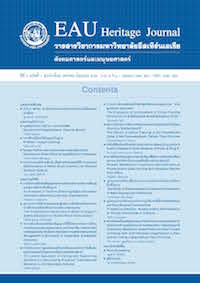ผลการดำเนินการฝึกอบรมคุณธรรมค่ายพุทธบุตรวัดปัญญานันทาราม จังหวัดปทุมธานี
Keywords:
การฝึกอบรมคุณธรรม, ค่ายพุทธบุตรวัดปัญญานันทาราม, จังหวัดปทุมธานี, Ethics training, Puthabutra camp, Pathum Thani ProvinceAbstract
การวิจัยนี้มุ่งศึกษาผลการดำเนินการฝึกอบรมคุณธรรมค่าย-พุทธบุตร ของผู้เข้ารับการฝึกอบรมคุณธรรม ค่ายพุทธบุตร วัดปัญญานันทาราม, เปรียบเทียบความคิดเห็นเกี่ยวกับผลการดำเนินการฝึกอบรมคุณธรรมค่ายพุทธ บุตร จำแนกตามปัจจัยภูมิหลัง ได้แก่ เพศ อายุ ระดับการศึกษา และประสบการณ์ในการทำงาน, และแนวทางการ พัฒนาการดำเนินการฝึกอบรมคุณธรรม เป็นการวิจัยเชิงปริมาณ ใช้แบบสอบถามเก็บข้อมูลจากกลุ่มตัวอย่างจำนวน 248 คน สุ่มจากครู 651 คนเป็นผู้เข้ารับการฝึกอบรมคุณธรรมค่ายพุทธบุตร จากโรงเรียนในเขตพื้นที่การศึกษา จำนวน 10 โรงเรียน สถิติที่ใช้ในการวิเคราะห์ข้อมูลได้แก่ ค่าร้อยละ คะแนนเฉลี่ย ความเบี่ยงเบนมาตรฐานและทดสอบ สมมติฐาน โดยใช้สถิติ t-test และ F-testในกรณีที่พบความแตกต่างของค่าเฉลี่ย มีการทดสอบเป็นรายคู่ใช้วิธีของ เชฟเฟ่ ผลของการศึกษาพบว่า ผลการดำเนินการฝึกอบรมคุณธรรมค่ายพุทธบุตร วัดปัญญานันทาราม ในภาพรวม อยู่ในระดับมาก ส่วนผลการเปรียบเทียบความแตกต่างระหว่างปัจจัยส่วนบุคคลกับผลการดำเนินการฝึกอบรมคุณธรรม ค่ายพุทธบุตรพบว่า ผู้เข้ารับการฝึกอบรมมีเพศ อายุ ระดับการศึกษา และประสบการณ์ในการทำงานแตกต่างกัน มีความคิดเห็นต่อผลการดำเนินการฝึกอบรมคุณธรรมค่ายพุทธบุตรในภาพรวมไม่แตกต่างกันซึ่งไม่เป็นไปตามสมมติฐาน ที่ตั้งไว้ และผลการศึกษาแนวทางพัฒนาพบว่ามีข้อเสนอแนะให้มี วิทยากรที่มีประสบการณ์ สามารถถ่ายทอดความรู้ ได้เป็นอย่างดี ให้ใช้เทคนิคในการบรรยายที่หลากหลายให้ผู้เข้ารับการอบรมสนใจมากขึ้น เวลาในการบรรยายควรกำหนด ให้มีความเหมาะสมและแบ่งเวลาให้ผู้เข้ารับการอบรมได้มีส่วนร่วมซักถามข้อสงสัย การฝึกอบรมควรมีรูปแบบที่เหมาะสม กับผู้เข้ารับการอบรม สถานที่ฝึกอบรมควรมีการปรับปรุงไม่ให้แออัดหนาแน่น
The Effects of Ethics Training of the Phuthabutra Camp In Wat Panyanantaram, Pathum Thani Province
This research aimed to study the effects of ethics training of the Phuthabutra camp of Wat Panyanantaram, Pathumthani province, then compare the trainees’ opinions on the effects of ethics training of the Phathabutra camp as classified by sex, age, level of education, and work experience, and explore guidelines for developing the ethics training camp.
The samples were 248 teachers attended the training in Phuthabutra camp selected randomly from 651 teachers in 10 schools. The data were collected by a questionnaire, and analyzed using percentage, mean, standard deviation, t-test, and F-test. In the case of finding the difference in average by LSD test using the Scheffe’s method. Results showed the trainees’opinions on the effects of ethics of the Phathabutra camp in ggeneral was at a high level, when comparing the trainees’ opininions there were no signifieant differences in sex, age, level of education and work experience, which were not corresponding with the hypotheses. The guidelines for development of the ethics training camp were as follows: the camp should invite experienced trainers who could transfer knowledge well, should use a variety of training techniques, trainers should be able to entertain trainees as well, lecture time should be adjusted to provide time for trainees to participate and to ask questions, training format should be appropriate to the trainees groups, and the training location should be improved so that it would not be too crowded.





